![]()

The Man From Morocco (1945)
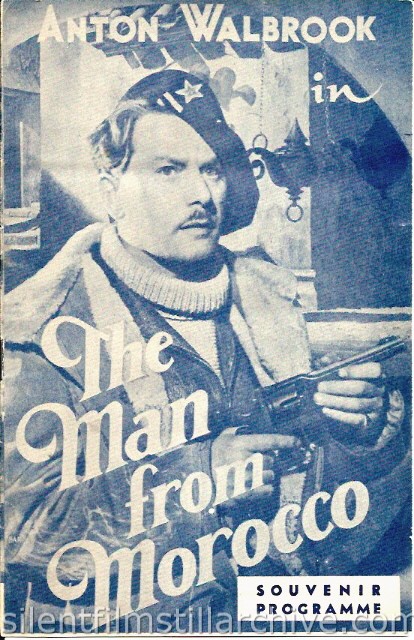
ANTON WALBROOK in
The Man from Morocco
SOUVENIR PROGRAMME
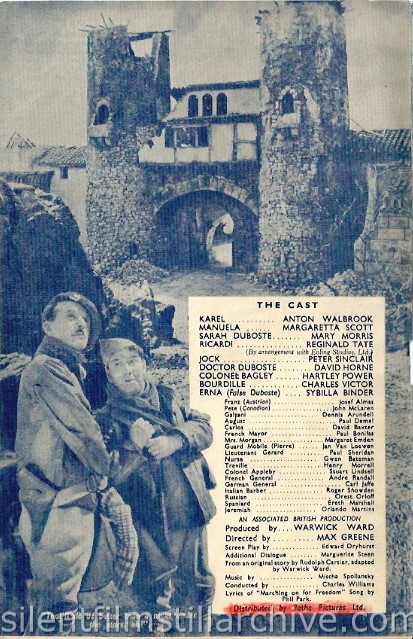
THE CAST
|
KAREL |
ANTON WALBROOK |
|
MANUELA |
MARGARETTA SCOTT |
|
SARAH DUBOSTE |
MARY MORRIS |
|
RICARDI |
REGINALD TATE (by arrangement with Ealing Studios, Ltd.) |
|
JOCK |
PETER SINCLAIR |
|
DOCTOR DUBOSTE |
DAVID HORNE |
|
COLONEL BAGLEY |
HARTLEY POWER |
|
BOURDILLE |
CHARLES VICTOR |
|
ERNA (False Duboste) |
SYBILLA BINDER |
|
Franz (Austrian) |
Josef Almas |
|
Pete (Canadian) |
John McLaren |
|
Galzani |
Dennis Arundell |
|
August |
Paul Demel |
|
Carlos |
David Baxter |
|
French Mayor |
Paul Bonifas |
|
Mrs. Morgan |
Margaret Emden |
|
Guard Mobile (Pierre) |
Jan Van Loewen |
|
Lieutenant Gerard |
Paul Sheridan |
|
Nurse |
Gwen Bateman |
|
Treville |
Henry Morrel |
|
Colonel Appleby |
Stuart Lindsell |
|
French General |
Andre Randall |
|
German General |
Carl Jaffe |
|
Italian Barber |
Roer Snowden |
|
Russian |
Orest Orloff |
|
Spaniard |
Ereth Marshall |
|
Jeremiah |
Orlando Martins |
AN ASSOCIATED BRITISH PRODUCTION
Produced by WARWICK
WARD
Directed by MAX GREENE
Screen Play by Edward Dryhurst
Additional
Dialogue Marguerite Steen
From an original story by Rudolph Cartier,
adapted by Warwick Ward.
Music by Mischa Spoliansky
Conducted by Charles
Williams
Lyrics of "Marching on for Freedom" Song by Phil Park.
Distributed by Pathe Pictures Ltd.
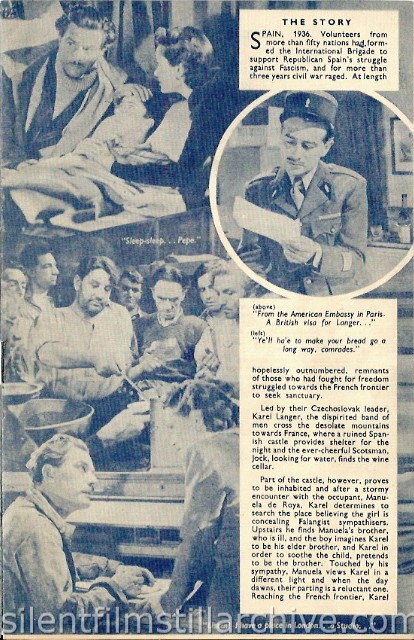
"That'll do us better than a night under the stars, eh?"
THE STORY
SPAIN, 1936. Volunteers from more than fifty nations had formed the International Brigade to support Republican Spain's struggle against Fascism, and for more than three years civil war raged. At length hopelessly outnumbered, remnants of those who had fought for freedom struggled towards the French frontier to seek sanctuary.
Lead by their Czechoslovak leader, Karel Langer, the dispirited band of men cross the desolate mountains towards France, where a ruined Spanish castle provides shelter for the night and the ever-cheerful Scotsman, Jock, looking for water, finds the wine cellar.
Part of the castle, however, proves to be inhabited and after a stormy encounter with the occupant, Manuela de Roya, Karel determines to search the place believing the girl is concealing Falangist sympathisers. Upstairs he finds Manuela's brother, who is ill, and the boy imagines Karel to be his elder brother, and Karel in order to sooth the child, pretends to be the brother. Touched by his sympathy, Manuela views Karel in a different light and when the day dawns, their parting is reluctant one. Reaching the French frontier, Karel
(above)
"From the American Embassy in Paris. A British visa for Langer&ldots;"
(left)
"Ye'll ha'e to make your bread go a long way, comrades."
"Listen! I have a place in London... a Studio..."
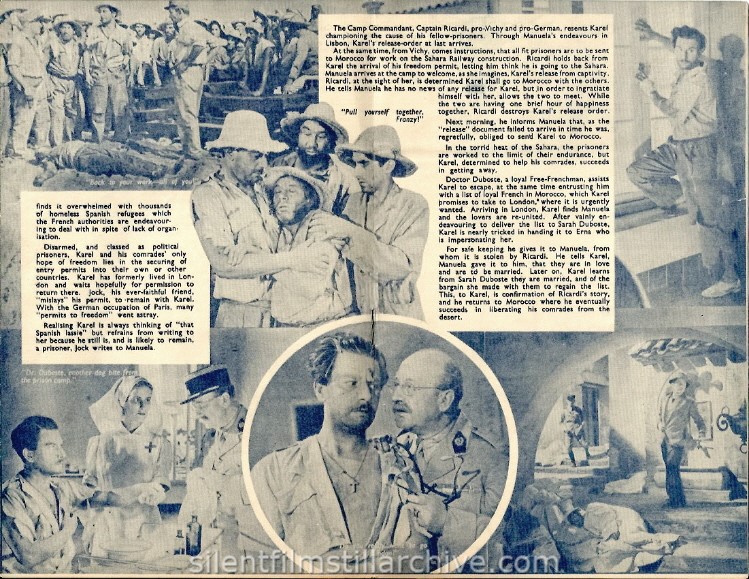
finds it overwhelmed with thousand of homeless Spanish refugees which the French authorities are endeavouring to deal with in spite of lack of organization.
Disarmed, and classed as political prisoners, Karel and his comrades' only hope of freedom lies in the securing of entry permits into their own or other countries. Karel has formerly lived in London and waits hopefully for permission to return there. Jock, his ever-faithful friend, "mislay" his permit, to remain with Karel. With the German occupation of Paris, many "permits to freedom" went astray.
Realising Karel is always thinking of "that Spanish lassie" but refrains from writing to her because he still is, and is likely to remain, a prison, Jock writes to Manuela.
The Camp Commandant, Captain Ricardi, pro-Vichy and pro-German, resents Karel championing the cause of his fellow-prisoners. Through Manuela's endeavours in Lisbon, Karel's release-order at last arrives.
At the same time, from Vichy, comes instructions, that all fit prisoners are to be sent to Morocco for work on the Sahara Railway construction. Ricardi holds back from Karel the arrival of his freedom permit, letting him think he is going to the Sahara. Manuela arrives at the camp to welcome, as she imagines, Karel's release from captivity. Ricardi, at the sight of her, is determined Karel shall go to Morocco with the others. He tells Manuela he has no news of any release for Karel, but in order to ingratiate himself with her, allows the two to meet. While the two are having one brief hour of happiness together, Ricardi destroys Karel's release order.
Next morning, he informs Manuela that, as the "release" document failed to arrive in time he as, regretfully, obliged to send Karel to Morocco.
In the torrid heat of the Sahara, the prisoners are worked to the limit of their endurance, but Karel, determined to help his comrades, succeeds in getting away.
Doctor Duboste, a loyal Free-Frenchman, assists Karel to escape, at the same time entrusting him with a list of loyal French in Morocco, which karel promises to take to London, where it is urgently wanted. Arriving in London, Karel finds Manuela and the lovers are re-united. After vainly endeavouring to deliver the list to Sarah Duboste, Karel is nearly tricked in handing it to Erna who is impersonating her.
For safe keeping he gives it to Manuela, from whom it is stolen by Ricardi. He tells Karel, Manuela gave it to him, that they are in love and are to be married. Later on, Karel learns from Sarah Duboste they are married, and of the bargain she made with them to regain the list. This, to Karel, is confirmation of Ricardi's story, and he returns to Morocco where he eventually succeeds in liberating his comrades from the desert.
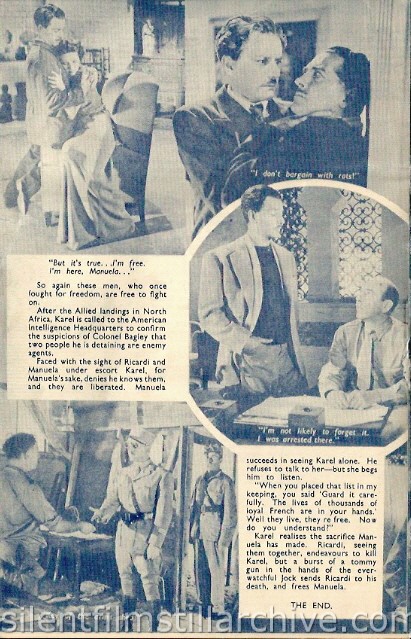
So again these men, who once fought for freedom, are free to fight on.
After the Allied landings in North Africa, Karel is called to the American Intelligence Headquarters to confirm the suspicions of Colonel Bagley that two people he is detaining are enemy agents.
Faced with the sight of Ricardi and Manuela under escort Karel, for Manuela's sake, denies he knows them, and they are liberated. Manuela succeeds in seeing Karel alone. He refuses to talk to her - but she begs him to listen.
"When you placed that list in my keeping, you said 'Guard it carefully. The lives of thousands of loyal French are in your hands.' Well they live, they're free. Now do you understand?"
Karel realizes the sacrifice Manuela has made. Ricardi, seeing them together, endeavours to kill Karel, but a burst of a tommy gun in the hands of the ever-watchful Jock sends Ricardi to his death, and frees Manuela.
THE END
"But it's true.. I'm free. I'm here, Manuela."
"I don't bargain with rats!"
"I'm not likely to forget it. I was arrested there."
"Key of the arms shed!"
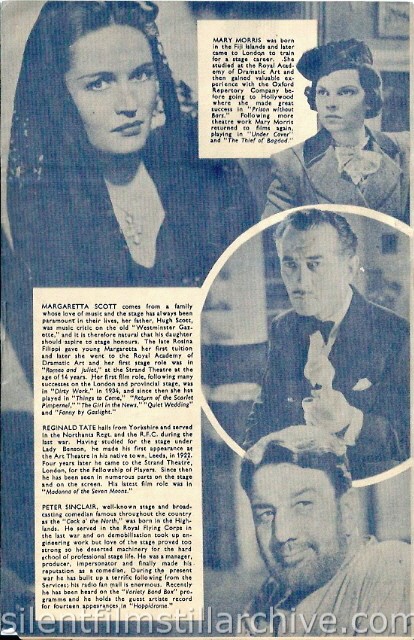
MARY MORRIS was born in the Fiji Islands and later came to London to train for a stage career. She studied at the Royal Academy of Dramatic Art and then gained valuable experience with the Oxford Repertory Company before going to Hollywood where she made great success in "Prison without Bars." Following more theatre work Mary Morris returned to films again, playing in "Under Cover" and "The Thief of Bagdad."
MARGARETTA SCOTT comes from a family whose love of music and the stage has always been paramount in their lives, her father, Hugh Scott, was music critic on the old "Westminster Gazette," and it is therefore natural that his daughter should aspire to stage honours. The late Rosina Filippi gave young Margaretta her first tuition and later she want to the Royal Academy of Dramatic Art and her first stage role was in "Romeo and Juliet," at the Strand Theatre at the age of 14 years. Her first film role, following many successes on the London and provincial stage, was in "Dirty Work," in 1934, and since then she has played in "Things to Come," "Return of the Scarlet Pimpernel," "The Girl in the News," "Quiet Wedding" and "Fanny by Gaslight."
REGINALD TATE hails from Yorkshire and served in the Northants Regt. And the R.F.C. during the last was. Having studied for the stage under Lady Benson, he made his first appearance at the Art Theatre in his native town, Leeds, in 1922. Four years later he came to the Strand Theatre, London, for the Fellowship of Players. Since then he has been seen in numerous parts on the stage and on the screen. His latest film role was in "Madonna of the Seven Moons."
PETER SINCLAIR, well-known stage and broadcasting comedian famous throughout the country as the "Cock o' the North," was born in the Highlands. He served in the Royal Flying Corps in the last war and on demobilization took up engineering work but love of the stage proved too strong so he deserted machinery for the hard school of professional stage life. He was a manager, producer, impersonator and finally made his reputation as a comedian. During the present war he has built up a terrific following from the Services; his radio fan mail is enormous. Recently he has been heard on the "Variety Band Box" programme and he holds the guest artiste record for fourteen appearances in "Happidrome."
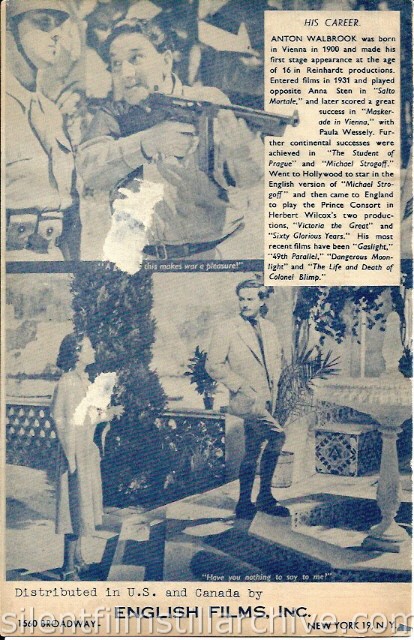
HIS CAREER
ANTON WALBROOK was born in Vienna in 1900 and made his first stage appearance at the age of 16 in Reinhardt productions. Entered films in 1931 and played opposite Anna Sten in "Salto Mortale," and later scored a great success in "Maskerade in Vienna," with Paula Wessely. Further continental successes were achieved in "The Student of Prague" and "Michael Strogoff." Went to Hollywood to star in the English version of "Michael Strogoff" and then came to England to play the Prince Consort in Herbert Wilcox's two productions, "Victoria the Great" and "Sixty Glorious Years." His most recent films have been "Gaslight," "49th Parallel," "Dangerous Moonlight" and "The Life and Death of Colonel Blimp."
"A gun like this make war a pleasure!"
"Have you nothing to say to me?"
Distributed in the U.S. and Canada by
ENGLISH FILMS, INC.
1560 BROADWAY
NEW YORK 19, N.Y.
with Anton Walbrook, Margaretta Scott and Mary Morris. Directed by Mutz Greenbaum. Associated British Picture Corporation/British Films.
More Information on this film...
Books
None
Last Modified March 18, 2015


















